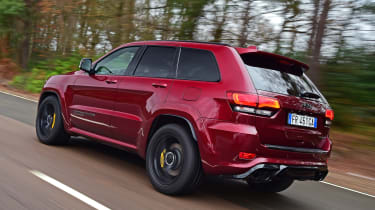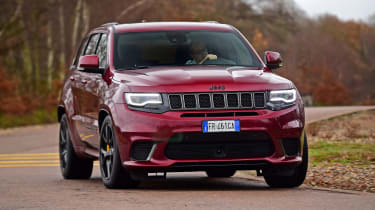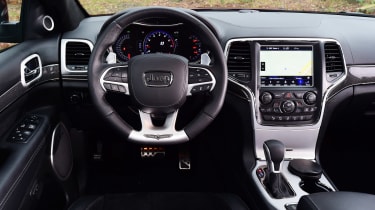Jeep Grand Cherokee SUV (2011-2021)
“The Jeep Grand Cherokee is a big, bold and characterful American SUV, but rivals outdo it in many respects”
Pros
- Better to drive than older Jeeps
- Well equipped for the price
- Spacious interior
Cons
- Limited engine choice
- Engine noisy on motorway
- Some interior materials feel cheap
Jeep is a globally recognised American brand with a rich and illustrious history. Its most recognised product is the Jeep Wrangler, a bare-bones SUV designed for leisure and recreation in America’s wide-open spaces. The Jeep Grand Cherokee sits at the opposite end of the range, designed to deliver an altogether more civilised experience.
It’s a full-size SUV and competes in size terms with cars such as the BMW X5, Volvo XC90 and Audi Q7. It’s a strict five-seater, though, whereas its rivals can offer a third row of seats for seven occupants in total. This is a restriction it shares with the Mercedes GLE, which is no coincidence as the Jeep shares some of its structure with the premium German SUV.
The choice of engines for the Grand Cherokee isn’t as broad as its European rivals: you can only choose from a 3.0-litre diesel and an enormous 6.2-litre petrol, with the latter producing more power than a Lamborghini Urus or Range Rover SVR. The petrol model, badged the Trackhawk, turns the Grand Cherokee into a very different kind of car – the sort of machine you might buy as a toy rather than practical family transport. Although some deep-pocketed drivers do use their V8 petrol Grand Cherokees on a daily basis, the diesel is still the default choice for the vast majority.
More reviews
Key to the enduring appeal of most Jeep products is their ability to deal with conditions off the beaten track. The Grand Cherokee is at least the equal of its European rivals away from the safety of smooth tarmac. However, to further build on its all-terrain abilities, a Trailhawk version is also available, with a host of upgrades to increase its agility and stamina when the going gets tough.
These include chunky Goodyear Adventure tyres reinforced with Kevlar to fend off sharp edges when crawling over rocks, air-suspension retuned to allow greater ground clearance, and axles with greater movement up and down, to increase the size of obstacles the Grand Cherokee Trailhawk can pass over. The underside of the body also gains extra protection, and the package is completed with redesigned bumpers and special decals that our test team described as “surprisingly tasteful”.
The Trackhawk model swaps off-road tyres for high-performance ones, along with stiff suspension, huge Brembo brakes and a special launch control mode that sees it complete 0-60mph in 3.5 seconds - incredible considering the car weighs 2.5 tonnes. Straight-line speed is certainly the Trackhawk's party trick because the handling feels distinctly unsettled on anything other than the smoothest roads.
Other plus points of the entire Grand Cherokee range are a generous equipment list, a truly huge interior and positive reports from existing owners. The Grand Cherokee has always focused on comfort and luxury, with driver involvement taking something of a back seat. While some may applaud this, those buyers after an SUV that performs in a sportier manner may find the BMW X5 more to their liking.
The Jeep Grand Cherokee is rather overshadowed by its European rivals, most of which offer stronger secondhand values and a more widely appreciated image. The Jeep ploughs its own furrow, though, and has built a loyal following of owners who appreciate the car’s individual nature and relative rarity on UK roads.
However, if you’re considering a Grand Cherokee for its off-road ability, we question how many UK buyers really need the added capabilities – and expense – of the Trailhawk package. The same thing goes for the 6.2-litre V8 Trackhawk. All that power brings excellent pub bragging rights, but little practical benefit over the already accomplished basic model. A 3.0-litre diesel version of the regular model does everything most people need an SUV to do.
The Grand Cherokee keeps being improved, too, despite getting closer to the end of its lifespan. The latest round of changes aims to improve quality and refinement, as well as giving in-car technology a welcome boost. Along with Active Noise Cancellation, the leather is now better quality, the 8.4-inch touchscreen supports Apple CarPlay and Android Auto and the big Jeep will even park itself.
MPG, running costs & CO2
The 6.2-litre V8 petrol-engined Grand Cherokee Trackhawk is best viewed as a completely different model to the standard 3.0-litre diesel car. It’s vastly more expensive to buy, while economy of 16.8mpg and CO2 emissions of 385g/km (placing it in the top 37% company-car tax band) mean it’ll be more expensive to run than almost anything else on the road. While it certainly has its charm, only a select few SUV customers are really after such a colossally powerful and thirsty engine.
Given the petrol engine’s limited mainstream appeal, it’s a shame that the only other engine choice – a 3.0-litre diesel – isn’t more economical. This engine returns 40.4mpg and emits 184g/km of CO2, leading to the same 37% BiK band as the petrol. While some may see 40mpg as perfectly reasonable for a large SUV, it's off the pace compared to the Grand Cherokee’s rivals. The most economical BMW X5 (aside from the hybrid model) returns 47.1mpg and emits 158g/km of CO2.
After the first year's CO2-based road tax (generally included in the on-the-road price), all Grand Cherokees cost £140 a year to tax. With a list price (including options) of more than £40,000, every version is also liable for an additional surcharge of £310 a year in years two to six, bringing the annual bill to £450 during that period.
Like all Jeeps, the Grand Cherokee comes with a five-year/75,000-mile warranty, an upgrade to the old three-year/60,000-mile warranty that was offered until July 2018. It’s part of a campaign called ‘5-3-5’, so named because customers get a five-year warranty, a three-year servicing programme and five years of roadside assistance. This gives the Jeep’s warranty an edge over the three years offered for rivals from Volkswagen, Audi, BMW and Mercedes. Hyundai matches Jeep’s five-year warranty (but with no mileage cap) and Kia provides an industry-leading seven years of cover.
Engines, drive & performance
The Jeep Grand Cherokee has been deliberately set up to prioritise comfort over outright handling, and that’s not necessarily a bad thing. While some hanker for an SUV that can be enjoyed on the twisting corners of a winding B-road, others seek a more cosseting driving experience. If you fall into the latter camp, the Grand Cherokee may well appeal.
On the road, the Grand Cherokee’s light steering and powerful diesel engine make driving an effortless endeavour, while the eight-speed automatic gearbox can be left in ‘drive’ and forgotten about as it shifts smoothly through the gears. Owing to its soft setup, there’s a fair bit of body lean when cornering and if you try to drive in a sporty manner, you may find that you and your passengers have a bit of a are left feeling a bit woozy journey. It’s here where the Grand Cherokee most feels its age next to agile models like the Range Rover Velar and Jaguar F-Pace.
The 3.0-litre diesel is powerful enough to get the Grand Cherokee from 0-62mph in 8.2 seconds and it’s the most sensible of the narrow range of engine options.
We advise you avoid the entry-level Limited+ model, as in all other trims (Overland, Summit and SRT), the Grand Cherokee comes with adjustable air suspension, which does a much better job of absorbing potholes and bumps than the standard setup.
Partially offsetting its slightly cumbersome nature on the road, the Grand Cherokee is undoubtedly very capable off it. Jeep’s 4x4 know-how goes back all the way to the Second World War, and the Grand Cherokee comes with a five-mode off-road controller, allowing you to set the car up perfectly depending on the terrain. While the Land Rover Discovery is similarly capable, there are few other civilised SUVs that can match the Grand Cherokee when it comes to off-road prowess.
The Trailhawk variant raises the off-road stakes still further. Augmenting the off-road controller is a ‘Selec-Speed Control’, which acts as low-speed cruise control for off-road use. The U-Connect infotainment system is also given extra functionality, including information on engine oil pressure and axle angle. On test, we found that its extra ground clearance prevented it from bottoming out on rocky obstacles and we were impressed by the way momentum was maintained on loose surfaces when using the ‘sand’ mode.
However, the test conditions we put the car through were far more demanding than what UK buyers are ever likely to encounter. While an element of built-in redundancy can be reassuring – it’s nice to know your car will always be within its comfort zone – the already capable basic Grand Cherokee offers all the off-road prowess most drivers will ever need.
If you prefer the feel of the road rather than mud under your tyres, the Trackhawk replaces the standard long-travel suspension with a much firmer setup, plus a set of enormous Brembo brakes. The real talking point, however, is the 6.2-litre V8 Hemi engine, with a huge 707bhp - more power than the 641bhp Lamborghini Urus and 567bhp Range Rover SVR. With launch control engage, the Trackhawk can do 0-60mph in 3.5 seconds, with several thunderclaps from the exhaust along the way.
Admittedly the Trackhawk’s straight-line performance is its strong suit, because even though it has lots of grip, British roads see the suspension bobbing restlessly even on the motorway. Body roll is well contained, but the steering feels a bit too numb for an enthusiasts’ car. It might be slower, but the homegrown Range Rover SVR feels better suited to British B-roads.
Interior & comfort
The Grand Cherokee was facelifted in 2013 and that update brought with it an improvement in interior materials. For the 2018 model year, the Grand Cherokee has been gone over again, with numerous small changes adding up to an impressive overall lift in quality.
By adding Active Noise Cancellation and acoustic glass windows, engineers have made the Grand Cherokee noticeably more relaxing to travel in. The Summit trim has received the most attention,the leather for the seats is now better quality and there’s even an Alcantara roof lining to help keep it abreast of competitors.
All five occupants should quickly feel at home thanks to sheer amount of space on offer. While many cars in this class offer the extra versatility of seven seats, the Grand Cherokee’s five-seat setup means front and rear passengers get acres of leg and headroom. The panoramic sunroof (standard on Overland, Summit and SRT cars), meanwhile, combined with a high seating position and large windows give the Grand Cherokee a light and spacious feel.
As we mentioned earlier, avoid the standard suspension if you can. While Jeep charges about £3,500 to move from entry-level Limited+ trim up to Overland, the adjustable suspension this adds (as well as some additional creature comforts) make the upgrade a wise one. With the standard suspension, we found the Grand Cherokee occasionally uncomfortable on poor road surfaces.
Assuming you go for the air suspension, the only other thing that takes away slightly from the Grand Cherokee’s cosseting driving experience is the diesel engine, which is a little too noisy at higher speeds and under acceleration. Wind noise is impressively well contained, as is tyre roar – even the deeply-treaded tyres of the Trailhawk package don’t transmit unacceptable noise inside.
In the Summit model, you can always drown out any noise with the 19-speaker Harman Kardon stereo. It’s easy to connect your phone, particularly if you want to use Android Auto or Apple CarPlay to see your smartphone’s functions on the 8.4-inch touchscreen. If not, it has its own sat nav built in. Also new for 2018 is the option to choose a bay and let the SUV park itself while you keep a watchful eye on the controls. Other features ushered in by the facelift include adaptive cruise control and a panoramic glass roof.
Practicality & boot space
Inside, the Grand Cherokee makes good use of its large exterior dimensions. Front and rear passengers get genuinely impressive legroom, while interior storage is taken care of by a variety of cup-holders, cubbies and door bins. It's a shame, though, that despite being such a large car, the Grand Cherokee isn’t available with seven seats. Rivals like the Volvo XC90 and Audi Q7 come with an extra pair of seats as standard, making them more versatile for families than the Grand Cherokee.
The 782-litre boot is accessed through a powered tailgate and will easily be big enough for most families. There’s also a retractable load cover to hide valuables out of sight, while dropping the rear seats sees boot space grow to 1,554 litres.
Like many cars of this size, parking can be tricky and some tighter spaces will simply be inaccessible. All Grand Cherokees come with a reversing camera, though, so once you’ve found a space, getting in is relatively hassle-free.
Reliability & safety
Jeep had a good year in our 2016 Driver Power customer satisfaction survey. The brand came 11th out of 32 manufacturers, placing it above Audi, BMW and Mercedes. The Grand Cherokee, meanwhile, came ninth out of 150 models indicating owners are very satisfied with their cars. High scores for performance, practicality, seat comfort and in-car technology impress, although there was one note of caution: the Grand Cherokee came 102nd for reliability, while Jeep as a brand came second from bottom in this area.
The Grand Cherokee was awarded four out of five stars in its Euro NCAP crash-worthiness assessments. Compare that to the five-star ratings of the Volvo XC90, Audi Q7 and Mercedes GLE-Class and it’s clear the Grand Cherokee is a little off the pace. The big Jeep scored poorly (45%) in pedestrian protection tests, while a 69% child occupant safety rating is reasonable, rather than exceptional.
Price, value for money & options
The Jeep Grand Cherokee is undoubtedly a well-equipped car. All models come with LED running lights, power-adjustable leather seats (heated front and rear), 20-inch alloy wheels, a heated steering wheel and sat nav. Do note that the old entry-level Laredo and Limited trims are no longer offered, while the Trackhawk trim is reserved for the 6.2-litre petrol engine.
The Trailhawk package, which further strengthens the Grand Cherokee’s off-road credentials, increases its cost and seems like overkill given the car’s already impressive capabilities. You should also be aware that the Grand Cherokee loses money quite quickly, particularly compared to cars like the BMW X5 and Audi Q7 and the added cost of the Trailhawk package is unlikely to be reflected by higher used values.
On the other hand, although, those who bought new may be disappointed when it’s time to trade in or sell on, secondhand buyers will find the Grand Cherokee something of a bargain.














